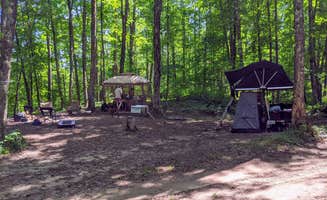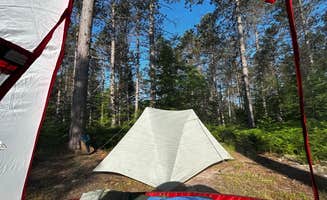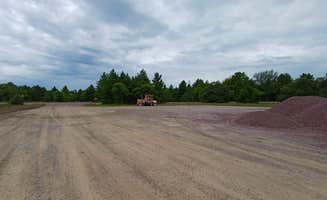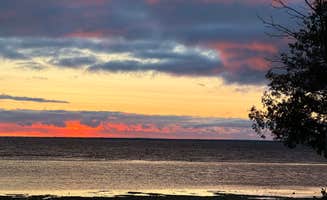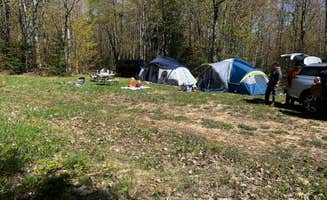Dispersed camping options in the Hiawatha National Forest provide primitive camping near Manistique, Michigan with varying levels of isolation and vehicle accessibility. The region experiences heavy seasonal mosquito activity from late spring through summer months, with peak infestation typically occurring in June and July. Winter camping remains available in most areas, though forest roads receive minimal maintenance during snow season.
What to do
Paddling opportunities: Kayakers at Herman Lake Dispersed can access protected waters ideal for beginner to intermediate paddlers. "We were able to kayak and it was beautiful and very private," notes suzanne C., who advises planning exit strategies due to potential weather changes.
Wildlife observation: The marsh areas surrounding Hickey Marsh Dispersed Camping provide bird watching opportunities, particularly during spring and fall migrations. Campers report sightings of sandhill cranes, various waterfowl species, and occasional deer at dawn and dusk.
Tree clearing adventures: At more remote sites like Ironjaw Lake Dispersed Campsite, visitors sometimes need to create their own access. "We did have to clear a bunch of down trees to get down the road but we had the site and the lakes to ourselves," reports Willow M., highlighting the trade-off between effort and solitude.
What campers like
Unexpected connectivity: Despite the remote location, campers at some sites report surprisingly good cellular coverage. "Cell service with Verizon was shockingly good," mentions Hunter W. about Hickey Marsh, while other areas maintain enough signal for basic communication needs.
Midweek solitude: Visiting during weekdays, especially outside peak summer months, drastically reduces encounters with other campers. Many sites report seeing only "2 car drive by in 2 days," according to Tim at Hickey Marsh Dispersed Camping.
Fishing access: Multiple lakes in the area support smallmouth bass, northern pike, and panfish populations. The scattered water bodies throughout the forest offer bank fishing options as well as opportunities for small watercraft launching at informal access points.
What you should know
Navigation challenges: Accurate directions can be problematic for several sites. Ben L. advises for Ironjaw Lake: "your best directions will come from locating the site on your GPS (in our case Google Maps) and dropping a pin. That took us straight to the location no problem."
Road conditions: Access roads deteriorate significantly after rainfall. The route to Herman Lake Dispersed involves "a very deeply rutted and muddy one lane road in for about 1.5-2 miles," according to suzanne C., who cautions against bringing trailers despite having successfully navigated with one.
Seasonal variations: Early season visits (April-May) offer advantages beyond insect avoidance. "We were lucky, we went pre-season," notes a camper about Ironjaw Lake, citing both reduced competition for sites and pristine conditions before heavy use.
Tips for camping with families
Bug management: Insect pressure varies significantly by location and season. Amy Y. warns about Hickey Marsh: "I would warn though that the mosquitoes were pretty bad when we visited." Families should bring appropriate repellents and protective clothing, particularly for evening hours.
Site selection timing: Arriving mid-week provides better opportunities to secure preferred sites. "We only found 2 pull in sites and took the first one," reports Tim about Hickey Marsh Dispersed Camping, indicating limited capacity at some locations.
Emergency planning: The remote nature of these sites necessitates self-sufficiency. With inconsistent cell service and significant distances from emergency services, families should bring comprehensive first aid supplies and communicate travel plans to others before departure.
Tips from RVers
Size limitations: Most dispersed sites accommodate smaller rigs only. Naomi L. shares about Hickey Marsh: "We pulled in a 15 foot trailer and turned it around but wouldn't go much bigger."
Leveling requirements: Bring substantial leveling blocks as most sites feature natural, ungraded surfaces. Campers report needing to level in multiple directions at forest sites where no site preparation has occurred.
Road reconnaissance: RV owners should consider scouting roads before committing to routes with trailers. One Herman Lake visitor recommends: "Although we stayed one night and made it to and from unscathed, we do not recommend towing down this road," suggesting that preliminary walks or drives without trailers can prevent difficult situations.


